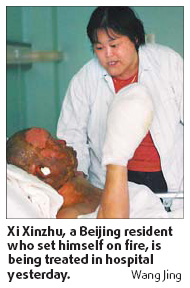Government and Policy
China may rebuild demolition rule after suicide
By Wang Jingqiong (China Daily)
Updated: 2009-12-17 07:13
 |
Large Medium Small |
Ten days after five legal scholars claimed in an open letter that the country's urban housing demolition regulation was "a breach of the Constitution", the State Council Legislative Affairs Office said yesterday it is working on fixing the problem.
"The State Council is very concerned about problems caused by the current regulation and has been working on a new regulation ever since the Property Law came out in 2007," he said. "But please, give us a bit more time because there are many issues related to this."
Gao made the remarks after meeting nine law professors yesterday morning at a Beijing hotel to solicit opinions about a possible revision.
Four of the nine were among the professors who wrote the open letter to the National People's Congress (NPC) on Dec 7 urging the country's top legislature to review the legitimacy of the urban housing demolition regulation.
The regulation allows the government to seize homes and land if they are needed for important projects.
In China, the NPC drafts laws and the State Council Legislative Affairs Office issues regulations. Laws have more legal weight than regulations.
In the letter, the professors said the regulation violates the basic principle of the Constitution and Property Law.
The open letter caused heated discussion across the country, especially in the light of the death of Tang Fuzhen, from Chengdu, the capital city of Sichuan province, who shocked the nation by setting herself on fire on Nov 13 to protest the forced demolition of her former husband's garment processing business and living space above it.
Tang died from her injuries 16 days later at a local hospital. The building she wanted to save has been torn down.

On Monday afternoon, Xi Xinzhu, from Beijing's Haidian district, set himself on fire in a similar incident after a demolition crew arrived to move out his family and start tearing down their home. Doctors said 10 percent of Xi's body was burned and he remained in hospital last night.
The NPC has not made any public comments about the open letter but Shen Kui, a law professor with Peking University who was among the five who sent the letter, said yesterday the NPC forwarded relevant materials to the State Council Legislative Affairs Office and suggested a revision.
The move triggered the meeting between the legal experts and the State Council Legislative Affairs Office yesterday.
"They (the scholars) offered many valuable opinions about the revision," Gao said after the meeting. "We will go on to hear opinions from relevant officials and individuals before we make a final draft public."
Shen praised the response from the NPC and the State Council.
"Most experts agree on general principles but more discussions are needed for some details," he told China Daily. "We all agree that the government should only confiscate land if it is in the public interest. The question is, how do you define public interest?"
Shen said discussion at the meeting also covered acceptable procedures for confiscating property and offering compensation.
He said everyone agreed compensation should be decided by the market and not by the government, as it is now.
Despite the fact that some details remain undecided, the revision of the regulation is likely to be another example of how civil input can push forward legislation.
In 2003, three scholars wrote an open letter to the NPC, calling for the scrapping or revision of a regulation allowing the relocation of urban vagrants and beggars. The letter followed the death of Xu Zhigang, a young college graduate, who was tortured and died in an asylum in Guangzhou.
The regulation was later abolished.







